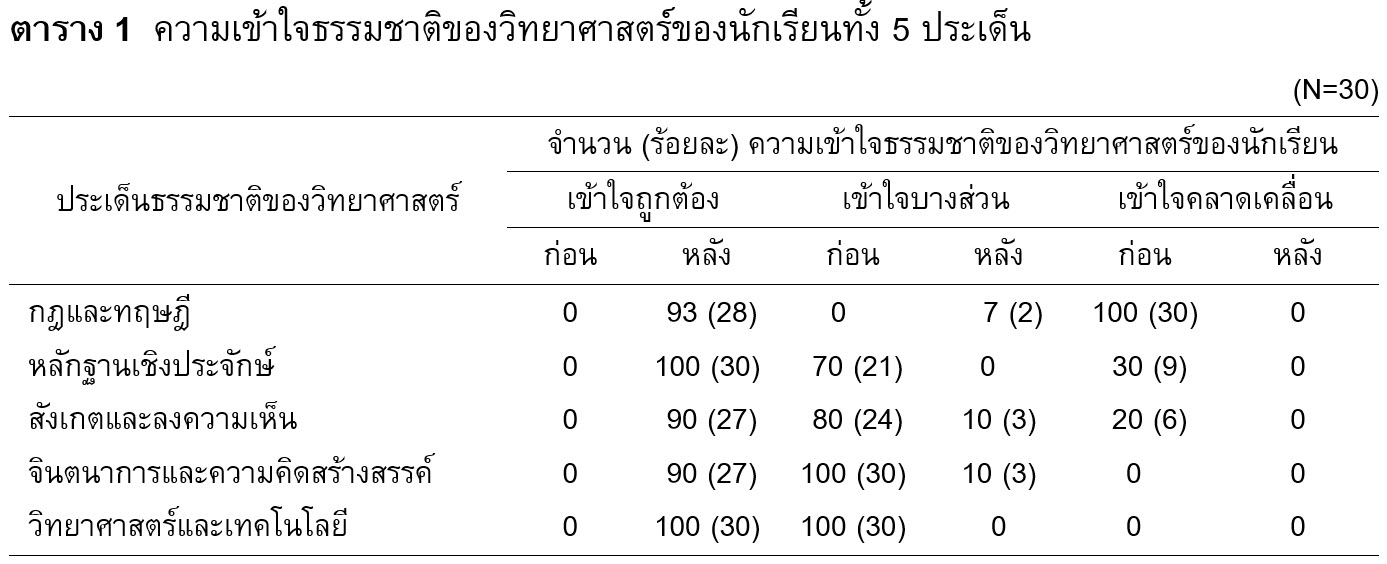การพัฒนาความเข้าใจธรรมชาติของวิทยาศาสตร์ของนักเรียนชั้นมัธยมศึกษาปีที่ 5 โดยการจัดการเรียนรู้แบบชัดแจ้งร่วมกับการอภิปรายสะท้อนความคิดเรื่อง ของแข็ง ของเหลว และแก๊ส
Main Article Content
Abstract
Pimpiran Panyo and Chatree Faikhamta
รับบทความ: 12 กุมภาพันธ์ 2559; ยอมรับตีพิมพ์: 25 มิถุนายน 2559
บทคัดย่อ
งานวิจัยเชิงปฏิบัติการในชั้นเรียนนี้มีวัตถุประสงค์เพื่อหาแนวทางในการจัดการเรียนรู้แบบชัดแจ้งร่วมกับการอภิปรายสะท้อนความคิด ในหน่วยการเรียนรู้เรื่องของแข็ง ของเหลว และแก๊ส เพื่อพัฒนาความเข้าใจธรรมชาติของวิทยาศาสตร์ของนักเรียนชั้นมัธยมศึกษาปีที่ 5 เก็บรวบรวมข้อมูลจากแบบบันทึกหลังการสอน อนุทินบันทึกการเรียนรู้ ใบงานและใบกิจกรรม และแบบวัดความเข้าใจธรรมชาติของวิทยาศาสตร์ก่อนเรียนและหลังเรียนร่วมกับแบบสัมภาษณ์กึ่งโครงสร้าง ผลการวิจัยพบว่า หลังการจัดการเรียนรู้นักเรียนพัฒนาความเข้าใจธรรมชาติของวิทยาศาสตร์เพิ่มขึ้นทุกประเด็น โดยเฉพาะประเด็นกฎและทฤษฎีทางวิทยาศาสตร์ ซึ่งแนวทางการจัดการเรียนรู้ที่ช่วยส่งเสริมให้นักเรียนเกิดการพัฒนาความเข้าใจธรรมชาติของวิทยาศาสตร์ได้เป็นอย่างดี คือ การบูรณาการธรรมชาติของวิทยาศาสตร์เข้าไปในแต่ละเนื้อหาอย่างสอดคล้องเหมาะสม การกระตุ้นให้นักเรียนอภิปรายสะท้อนความคิดด้วยกิจกรรมที่น่าสนใจและมีการประเมินความเข้าใจร่วมกันผ่านการอภิปรายโต้แย้ง
คำสำคัญ: ธรรมชาติของวิทยาศาสตร์ การสอนแบบชัดแจ้งร่วมกับการสะท้อนความคิด
Abstract
This action research aimed to investigate the effective ways to teach nature of science (NOS) by using explicit and reflective approach integrated in the topic of solid, liquid and gas, as well as to develop grade-11 students’ understanding of the nature of science. Data were collected through teacher reflective journals, students’ reflective journals, worksheets and pre-post open-ended questionnaire with semi-structured interviews. The findings indicated that explicit-reflective teaching approach integrated NOS into the unit of solid, liquid and gas can improve students’ understanding of all NOS aspects, particularly the law and theory aspect. The effective ways to develop students’ understandings of the nature of science are using explicit-reflective teaching methods with harmonious integration of NOS into the specific chemistry concepts; encouraging students to express their ideas from interesting activities, and assessing their ideas with argumentation.
Keywords: Nature of science, Explicit and reflective approach
Downloads
Article Details

This work is licensed under a Creative Commons Attribution-NonCommercial 4.0 International License.
References
Akerson, V., Abd‐El‐Khalick, F., and Lederman, N. G. (2000). Influence of a reflective explicit activity‐based approach on elementary teachers’ conceptions of nature of science. Journal of Research in Science Teaching 37(4): 295–317.
Altrichter, H., Kemmis, S., McTaggart, R., and Zuber‐Skerritt, O. (2002). The concept of action research. The Learning Organization 9(3): 125–131.
American Association for the Advancement of Science [AAAS]. (1990). Science for All Americans. New York: Oxford University.
Bell, R., Lederman, N. G., and Abd‐El‐Khalick, F. (1998). Implicit versus explicit nature of science instruction: An explicit response to Palmquist and Finley. Journal of Research in Science Teaching 35(9): 1057–1061.
Chamrat, S., Yutakom, N., and Chaiso, P. (2009). Grade 10 science students’ understanding of the nature of science. Khon Kaen University Research Journal 14(4): 360–374. (in Thai)
Clough, M. P., and Olson, J. K. (2004). The nature of science: Always part of the science story. The Science Teacher 71(9): 28–31.
Dewey, J. (1933). How we think: A restatement of the relation of reflective thinking to the educative process. Boston: Heath and Company.
Faikhamta, C. (2012). Pedagogical content knowledge for teaching nature of science. Khon Kaen University Research Journal 2(2): 233–260. (in Thai)
Hanuscin, D. L., Lee, M. H., and Akerson, V. L. (2011). Elementary teachers’ pedagogical content knowledge for teaching the nature of science. Science Education 95: 145–167.
Institute for the Promotion of Teaching Science and Technology [IPST]. (2008). The Ministry of Education Sets: The Education Standards. Bangkok: Author. (in Thai)
Khishfe, R. (2008). The development of seventh graders’ views of nature of science. Journal of Research in Science Teaching 45(4): 470–496.
Khishfe, R. (2014). Explicit nature of science and argumentation instruction in the context of sociocientific issues: An effect on student learning and transfer. International Journal of Science Education 36(6): 974–1016.
Kijkuakul, S., Yutakom, N., and Engkagul, A. (2005). Grade 11 students’ understandings about the nature of science. Kaset-sart Journal of Social Sciences 26(2): 133–145. (in Thai)
Lederman, N. G. (1992). Students’ and teachers’ conceptions of the nature of science. Journal of Research in Science Teaching 29(4): 331–359.
Mahalee, K. (2010). Developing views of the seventh grade students’ understandings of nature of science using explicit and reflective approach. Master of Education Thesis in Science Education. Bangkok: Kasetsart University. (in Thai)
McComas, W. (1998). The Nature of Science in Science Education. Dordrecht: Kluwer Academic.
National Research Council [NRC]. (1996). Inquiry and the National Science Education Standards. Washington, DC: National Academic.
National Science Teachers Association [NSTA]. (2000). Position Statement on the Nature of Science. Retrieved from http://www. nsta.org/positionstatement&psid=22, November 14, 2014.
Pattamapongsa, A. (2012). Development of high school student’s views of nature of science in photosynthesis learning unit using explicit NOS approach. Master of Education Thesis in Science Education. Bangkok: Kasetsart University. (in Thai)
Schwartz, R., and Lederman, N. G. (2002). It's the nature of the beast: The influence of knowledge and intentions on learning and teaching nature of science. Journal of Research in Science Teaching 39 (3): 205–236.
Schwartz, R., Lederman, N. G., and B. Crawford. (2004). Developing views of nature of science in an authentic context: An explicit approach to bridging the gap between nature of science and scientific inquiry. Science Education 88(4): 610–645.
